Sex Matters writes to the NHS Confederation
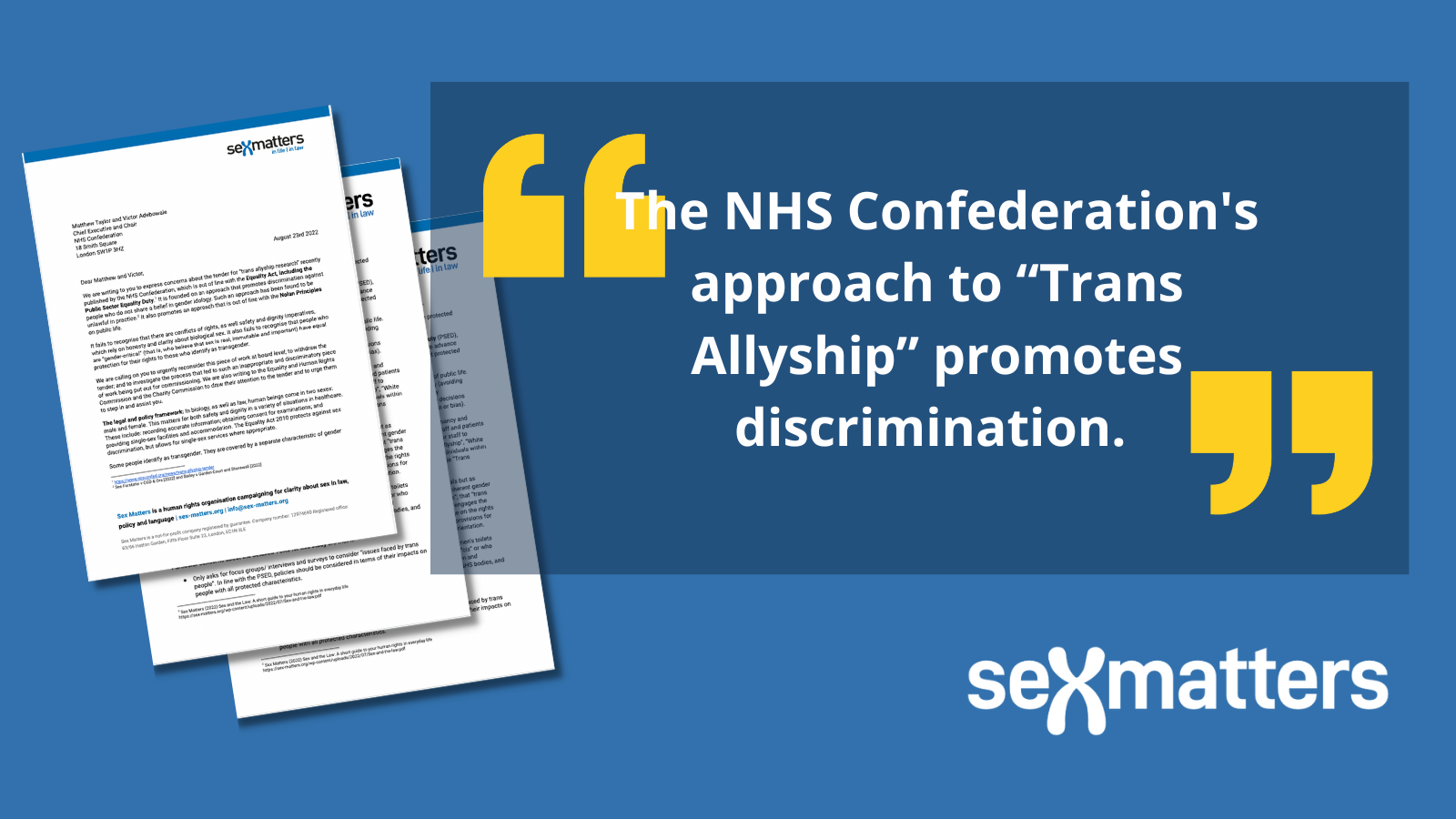
The NHS Confederation is the membership body for NHS services in England, Wales and Northern Ireland. Its members employ over 1.5 million staff, care for more than a million patients a day and control £150 billion of public expenditure. It recently sought bids for a piece of work to create:
“a practical guide for senior healthcare leaders, equipping them with the knowledge and confidence to model meaningful trans and non-binary allyship. The guide should also include ideas for supporting NHS organisations when they face opposition from anti-trans groups and individuals.”
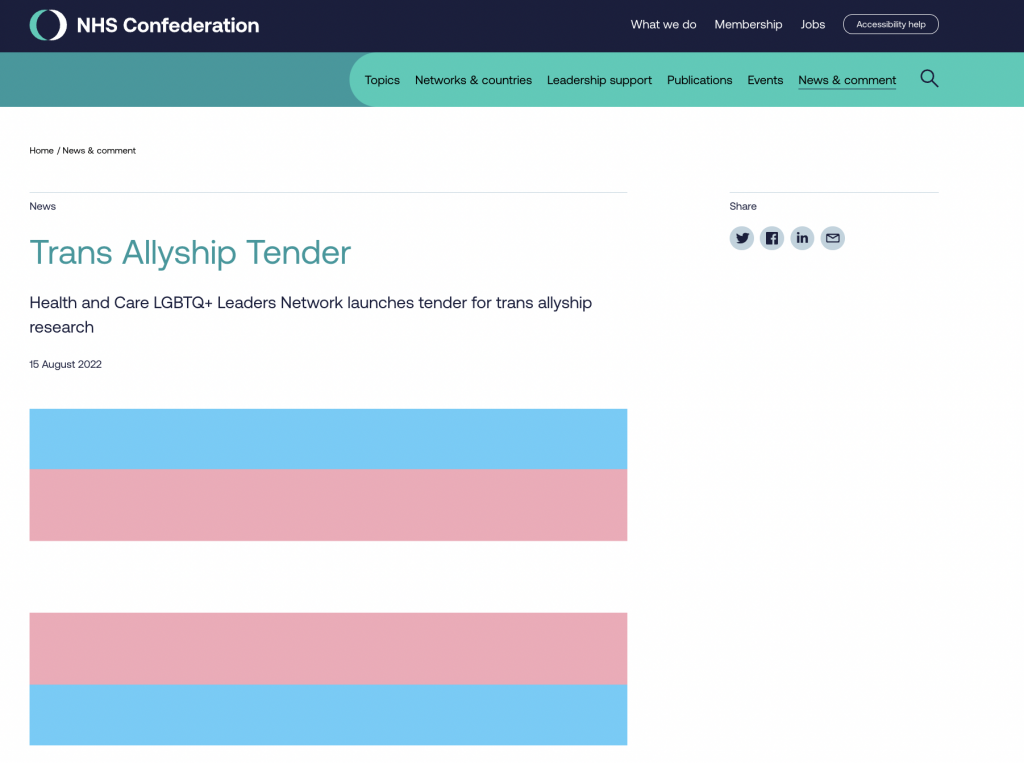
We have written to the Chief Executive of the NHS Confederation, Matthew Taylor, and its Chair, Victor Adebowale, to raise an alarm over this partisan approach. The work they are planning to do promotes discrimination and is out of line with the Equality Act and the Nolan Principles.
We have called on them to reconsider this piece of work at board level; to withdraw the tender; and to investigate the process that led to such an inappropriate and discriminatory piece of work being put out for commissioning. We have also written to the Equality and Human Rights Commission and the Charity Commission (which regulates the NHS Confederation as a charity).
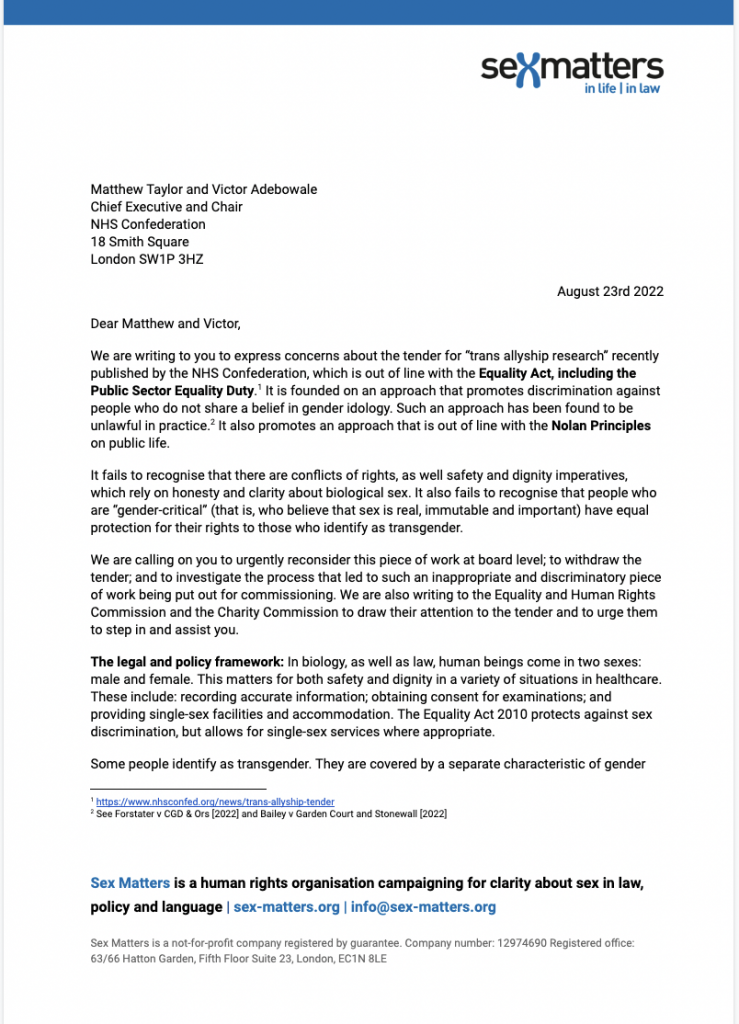
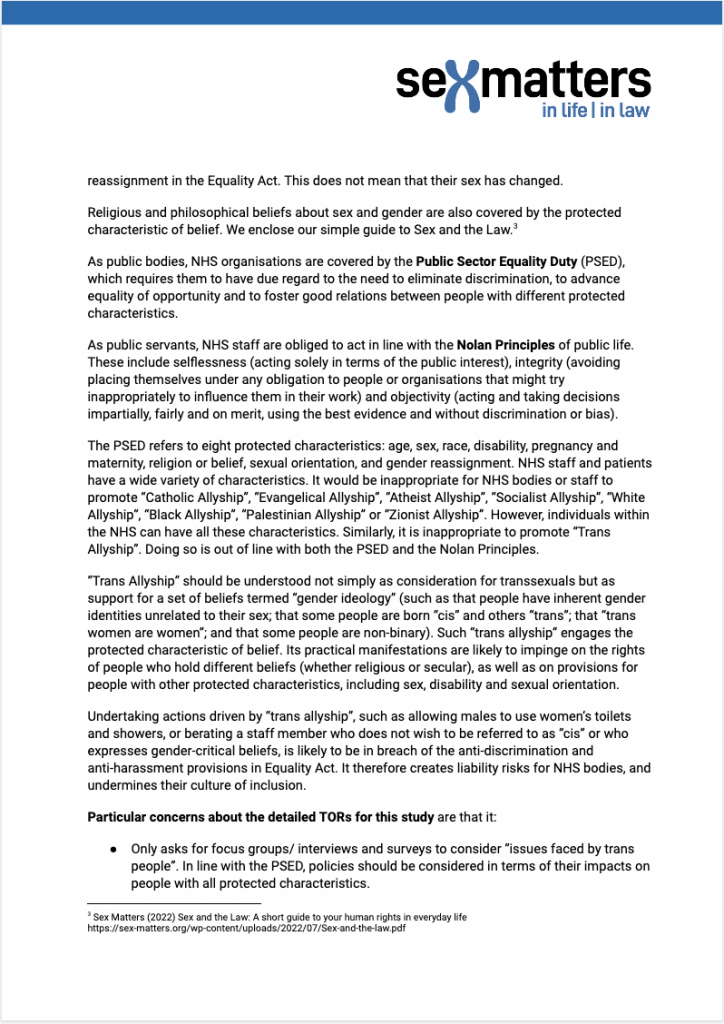
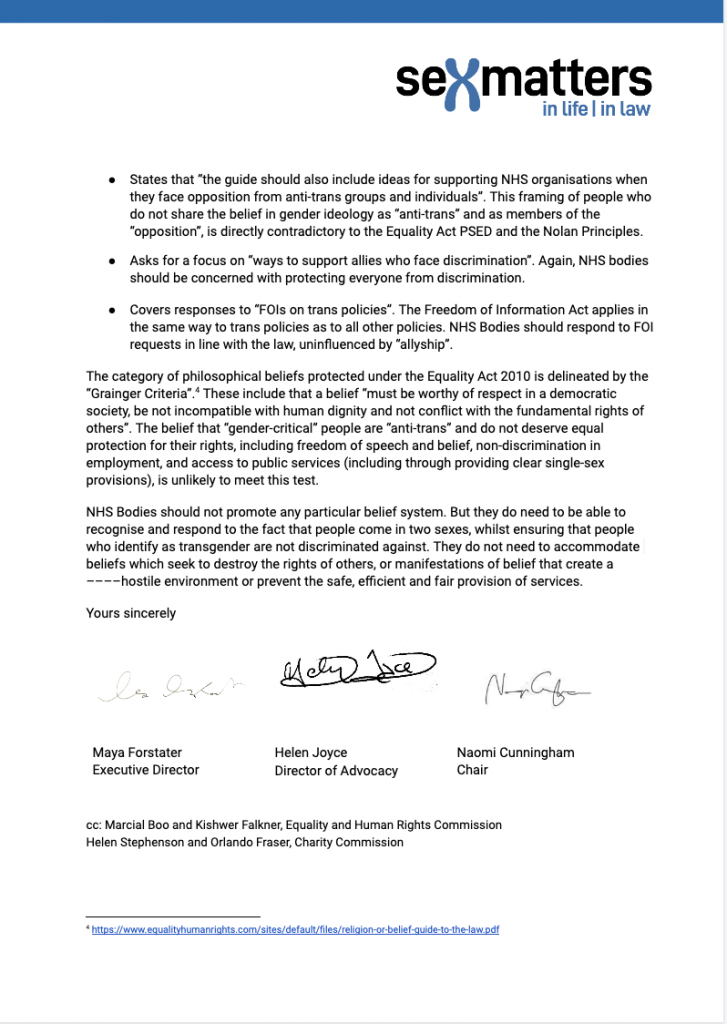
Dear Matthew and Victor,
We are writing to you to express concerns about the tender for “trans allyship research” recently published by the NHS Confederation, which is out of line with the Equality Act, including the Public Sector Equality Duty. It is founded on an approach that promotes discrimination against people who do not share a belief in gender ideology. Such an approach has been found to be unlawful in practice (see Forstater v CGD & Ors [2022] and Bailey v Garden Court and Stonewall [2022]). It also promotes an approach that is out of line with the Nolan Principles on public life.
It fails to recognise that there are conflicts of rights, as well safety and dignity imperatives, which rely on honesty and clarity about biological sex. It also fails to recognise that people who are “gender-critical” (that is, who believe that sex is real, immutable and important) have equal protection for their rights to those who identify as transgender.
We are calling on you to urgently reconsider this piece of work at board level; to withdraw the tender; and to investigate the process that led to such an inappropriate and discriminatory piece of work being put out for commissioning. We are also writing to the Equality and Human Rights Commission and the Charity Commission to draw their attention to the tender and to urge them to step in and assist you.
The legal and policy framework: In biology, as well as law, human beings come in two sexes: male and female. This matters for both safety and dignity in a variety of situations in healthcare. These include: recording accurate information; obtaining consent for examinations; and providing single-sex facilities and accommodation. The Equality Act 2010 protects against sex discrimination, but allows for single-sex services where appropriate.
Some people identify as transgender. They are covered by a separate characteristic of gender reassignment in the Equality Act. This does not mean that their sex has changed.
Religious and philosophical beliefs about sex and gender are also covered by the protected characteristic of belief. We enclose our simple guide to Sex and the Law.
As public bodies, NHS organisations are covered by the Public Sector Equality Duty (PSED), which requires them to have due regard to the need to eliminate discrimination, to advance equality of opportunity and to foster good relations between people with different protected characteristics.
As public servants, NHS staff are obliged to act in line with the Nolan Principles of public life. These include selflessness (acting solely in terms of the public interest), integrity (avoiding placing themselves under any obligation to people or organisations that might try inappropriately to influence them in their work) and objectivity (acting and taking decisions impartially, fairly and on merit, using the best evidence and without discrimination or bias).
The PSED refers to eight protected characteristics: age, sex, race, disability, pregnancy and maternity, religion or belief, sexual orientation, and gender reassignment. NHS staff and patients have a wide variety of characteristics. It would be inappropriate for NHS bodies or staff to promote “Catholic Allyship”, “Evangelical Allyship”, “Atheist Allyship”, “Socialist Allyship”, “White Allyship“, “Black Allyship”, “Palestinian Allyship” or “Zionist Allyship”. However, individuals within the NHS can have all these characteristics. Similarly, it is inappropriate to promote “Trans Allyship”. Doing so is out of line with both the PSED and the Nolan Principles.
“Trans Allyship” should be understood not simply as consideration for transsexuals but as support for a set of beliefs termed “gender ideology” (such as that people have inherent gender identities unrelated to their sex; that some people are born “cis” and others “trans”; that “trans women are women”; and that some people are non-binary). Such “trans allyship” engages the protected characteristic of belief. Its practical manifestations are likely to impinge on the rights of people who hold different beliefs (whether religious or secular), as well as on provisions for people with other protected characteristics, including sex, disability and sexual orientation.
Undertaking actions driven by “trans allyship”, such as allowing males to use women’s toilets and showers, or berating a staff member who does not wish to be referred to as “cis” or who expresses gender-critical beliefs, is likely to be in breach of the anti-discrimination and anti-harassment provisions in Equality Act. It therefore creates liability risks for NHS bodies, and undermines their culture of inclusion.
Particular concerns about the detailed TORs for this study are that it:
- only asks for focus groups/ interviews and surveys to consider “issues faced by trans people”. In line with the PSED, policies should be considered in terms of their impacts on people with all protected characteristics
- states that “the guide should also include ideas for supporting NHS organisations when they face opposition from anti-trans groups and individuals”. This framing of people who do not share the belief in gender ideology as “anti-trans” and as members of the “opposition”, is directly contradictory to the Equality Act PSED and the Nolan Principles
- asks for a focus on “ways to support allies who face discrimination”. Again, NHS bodies should be concerned with protecting everyone from discrimination
- covers responses to “FOIs on trans policies”. The Freedom of Information Act applies in the same way to trans policies as to all other policies. NHS Bodies should respond to FOI requests in line with the law, uninfluenced by “allyship”.
The category of philosophical beliefs protected under the Equality Act 2010 is delineated by the “Grainger Criteria”. These include that a belief “must be worthy of respect in a democratic society, be not incompatible with human dignity and not conflict with the fundamental rights of others”. The belief that “gender-critical” people are “anti-trans” and do not deserve equal protection for their rights, including freedom of speech and belief, non-discrimination in employment, and access to public services (including through providing clear single-sex provisions), is unlikely to meet this test.
NHS bodies should not promote any particular belief system. But they do need to be able to recognise and respond to the fact that people come in two sexes, whilst ensuring that people who identify as transgender are not discriminated against. They do not need to accommodate beliefs which seek to destroy the rights of others, or manifestations of belief that create a hostile environment or prevent the safe, efficient and fair provision of services.
